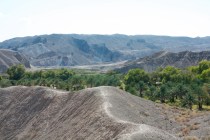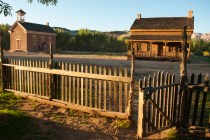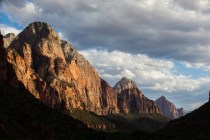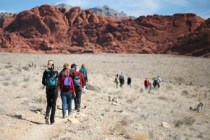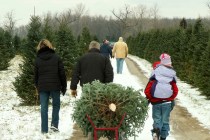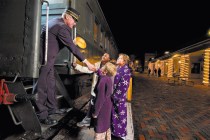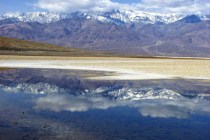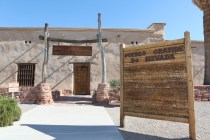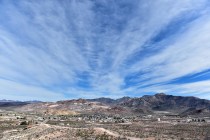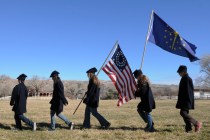Historic Hamblin home offers look into life of frontier families
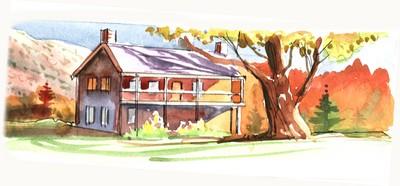
Most of Southern Utah’s historic towns boast charming structures from the region’s pioneer past. Drive the grid of streets marking the old core of towns that were settlements in frontier times to spot adobe, stone and log buildings from the earliest days. Neighboring Victorian homes of many styles date from later years when townspeople could afford more ease and elegance.
The sturdy Jacob Hamblin home in Santa Clara near St. George remains one of the finest examples of frontier construction in the area. Using local stone and timber cut in the Pine Valley Mountains, craftsmen built the rustic residence 145 years ago while the explorer completed one of many missionary and peacemaking expeditions among native tribes in Utah and Arizona.
Santa Clara lies on the outskirts of St. George, about 125 miles from Las Vegas. Follow Interstate 15 north 120 miles, exiting on Bluff Street in St. George. Turn left to follow this major connector. Bear left on Sunset to Santa Clara Boulevard, which approximates old U.S. Highway 91. The Hamblin home sits above the Santa Clara River on Hamblin Drive.
Now owned by the Mormon church, the restored dwelling remains open year-round for free guided tours. Visit the house from 9 a.m. to 5 p.m. in winter. In spring and summer, the hours extend into the evening. Visitors find the two-story house equipped with pioneer era implements and furnished with period pieces, many original to the Hamblin residence.
Visitors glimpse what life was like for frontier families who had to be self-sufficient. The Hamblins raised cattle and sheep for meat, tallow, hides, milk and wool. They grew fruits, vegetables, grains and medicinal plants. They spun cotton, linen flax and wool into thread and yarn, then wove fabrics for clothing, bed and table linens, blankets and rugs.
Visitors also see how a polygamous household was run, as the house was constructed for two wives. Born in Ohio, Jacob Hamblin grew up a pioneer, helping his father open new farmland in Wisconsin. He married at age 20 and began his family with his first wife, Lucinda. When he joined a new faith two years later, she did not share his enthusiasm for Mormonism, but followed him as far as Kansas. When he decided to head west across the prairies with the Mormons to Utah in 1850, she stayed behind. Lucinda died in 1853.
Hamblin assumed custody of their four children, married Rachel Judd, a widow with two children, and headed west. In 1857, he married Priscilla Leavitt and after Rachel died in 1864, he married Louisa Bonelli. In all, he fathered 24 children and adopted several American Indian youngsters.
Hamblin settled first south of Salt Lake in Tooele Valley, where an incident with a nonfiring rifle during a skirmish convinced him that he must deal with Indians through negotiation, not bloodshed. He began a long career as frontier peacemaker, learning several Indian languages to facilitate diplomacy. His efforts resulted in improved relations between the Mormon settlers and several native cultures. Hamblin made several trips into Hopi pueblos in Arizona, reopening the Crossing of the Fathers on the Colorado River, later known as Lee’s Ferry. One of his greatest accomplishments was the signing of the treaty with the Navajos at Fort Defiance in New Mexico in 1870.
In 1855, Mormon leader Brigham Young called upon Hamblin to pioneer in Southern Utah and work with the Paiutes. Hamblin helped build a fort near the Santa Clara River where settlers’ families lived part of the year, establishing summer homes in the cooler mountain valleys. Hamblin and his brother William established a cattle and sheep ranch 35 miles northwest near Mountain Meadows, site of the infamous Mountain Meadows Massacre of 1859.
In early 1862, a flash flood destroyed the Santa Clara Fort, forcing Hamblin to begin building a larger residence on higher ground, completed in 1863. The family moved on to help settle Kanab, Utah, in 1869, and towns in Arizona and New Mexico over the years. The respected frontiersman became a federal fugitive as a polygamist and died in New Mexico in 1886, while on the run.
Margo Bartlett Pesek’s column appears on Sundays.
MARGO BARTLETT PESEKMORE COLUMNS


